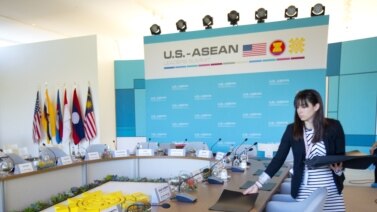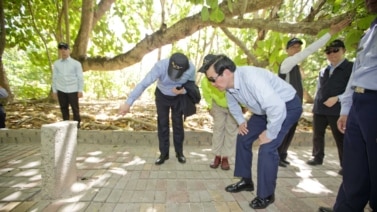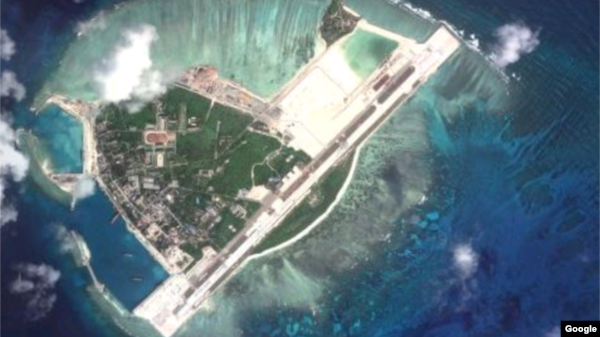
Officials in Taiwan and the United States say China has deployed surface-to-air missiles on a disputed island in the South China Sea.
The news comes as President Barack Obama completes a summit with Southeast Asian leaders in California. During the meeting, the president urged restraint and a halt to the militarization of disputed maritime areas.
Fox News reported on images released by civilian satellite company ImageSat International. The report says the images show two batteries of eight surface-to-air missile launchers. It says a radar system has been deployed to the area called Woody Island.
US and Taiwan confirm reports
Reports of the missiles brought criticism from the U.S. State Department.
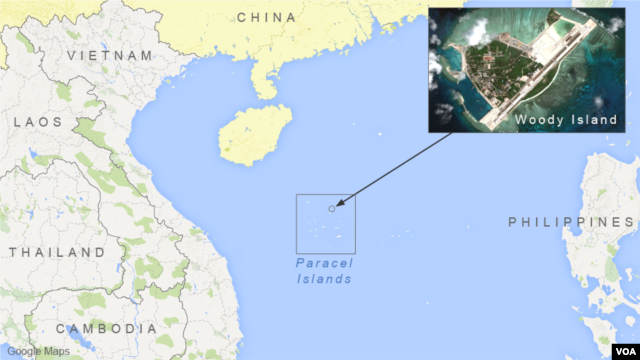
A U.S. defense official confirmed the deployment. Taiwan’s Defense Ministry spokesman Major General David Lo agreed.
Wednesday, Lo said, "Interested parties should work together to maintain peace and stability in the South China Sea region and refrain from taking any unilateral measures that would increase tensions."
Woody Island is called Yongxing Island in Chinese and Phu Lam in Vietnamese. The island is the largest of the Paracel Islands. It is in the northern part of the South China Sea, east of the central Vietnamese city of Da Nang. Woody Island has been under China’s control since 1956.
Vietnam and Taiwan also claim the island.
China’s foreign ministry and U.S. State Department react
China’s Foreign Minister Wang Yi spoke to reporters Wednesday. He said Western media should pay more attention to lighthouses and meteorological facilities China is building in the South China Sea.
Wang did not deny reports about the missile deployments after a meeting with visiting Australian Minister of Foreign Affairs Julie Bishop. However, he called them “an attempt by certain Western media to create news stories.”
Wang said China had a right to limited and necessary self-defense facilities on its islands and reefs.
"This is consistent (with) self-preservation and self-protection that China is entitled to under international law. So there should be no question about that," Wang said.
U.S. Secretary of State John Kerry disagreed. In reaction to the recent reports, the secretary noted: “We have said repeatedly with respect to China that the standard that should be applied to all countries with respect to the South China Sea is no militarization.”
China’s claims in the South China Sea
China’s claims in the South China Sea have concerned its neighbors. In recent years, China has built runways and artificial islands to increase its territorial claims.
Alexander Huang is an assistant professor at Taiwan’s Tamkang University. He said the deployment was sending contradictory signals about China’s future activities in the South China Sea.
Huang said this is because China has repeatedly said that it would not militarize the disputed islands.
President Obama speaks at the ASEAN summit
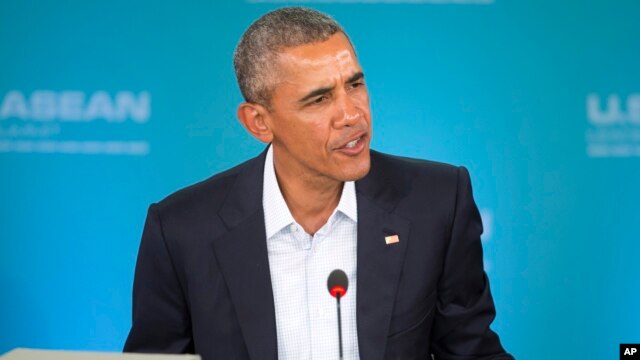
At a two-day summit with the leaders of the Association of Southeast Asian Nations, President Barack Obama spoke about the need to avoid tension. It was the first time the group met in the U.S.
Obama said the group supported a “strong commitment to a regional order where international rules and norms – and the rights of all nations, large and small – are upheld.”
He said U.S. and ASEAN leaders “discussed the need for tangible steps in the South China Sea to lower tensions, including a halt to further reclamation, new construction and militarization of disputed areas.”
Freedom of navigation actions
Experts say actions by the U.S. Navy to ensure free navigation have not changed Chinese building in the South China Sea. Ross Darrell Feingold is a top advisor at DC International Advisory, a group that studies political risk.
He said the action could show China’s ability to deal with more than one major issue at a time.
“There is the aftermath of the North Korea missile test and nuclear test, the ASEAN Summit, significant political change in Taiwan, ongoing domestic challenges – economy, corruption investigations – yet the Chinese leadership remains confident it can, at the same time, manage the international reaction to its missile deployment,” he said.
I'm Mario Ritter.
Bill Ide reported this story for VOANews.com. Mario Ritter adapted it for Learning English. Kathleen Struck was the editor.
Words in This Story
batteries – n. a group of two or more weapons such as large guns or missiles
refrain – v. to stop oneself from doing something
reefs – n. rocks or corral formations just below or just above the surface of the ocean
meteorological – adj. related to meteorology: the science that deals with the atmosphere and weather
artificial – adj. not happening or existing naturally; man-made
norms – n. standards of proper or acceptable behavior
